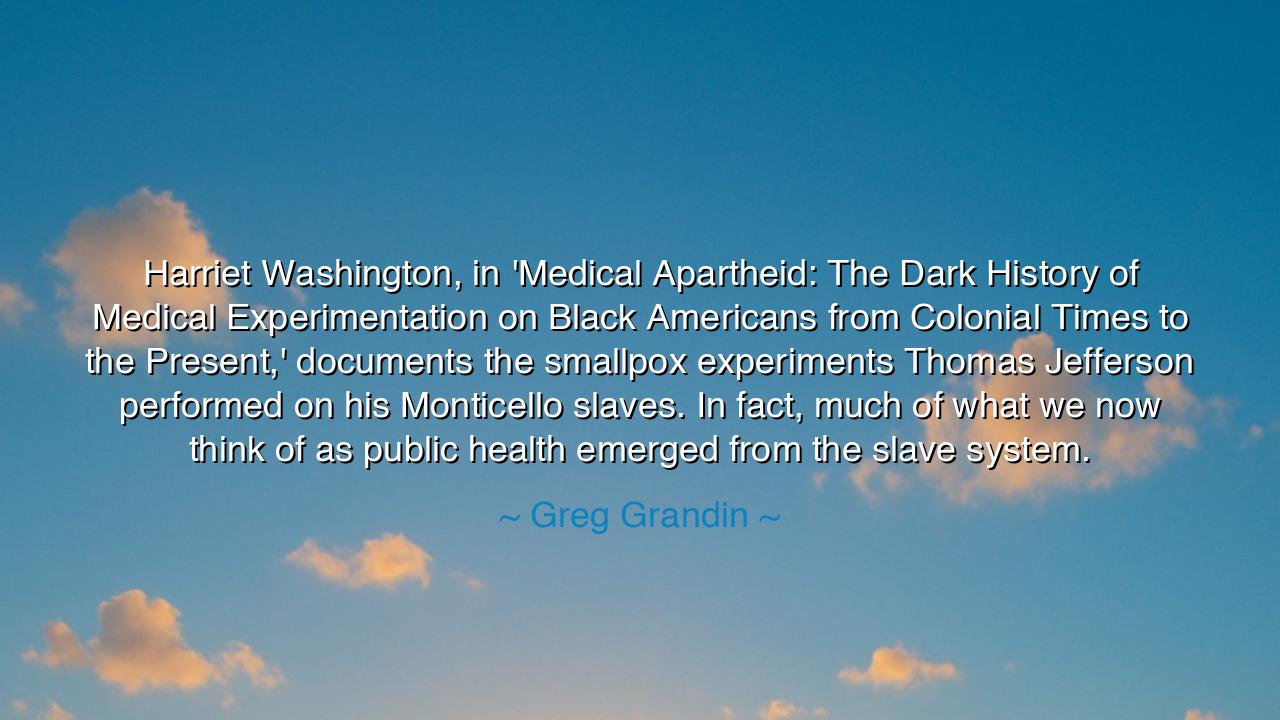
Harriet Washington, in 'Medical Apartheid: The Dark History of
Harriet Washington, in 'Medical Apartheid: The Dark History of Medical Experimentation on Black Americans from Colonial Times to the Present,' documents the smallpox experiments Thomas Jefferson performed on his Monticello slaves. In fact, much of what we now think of as public health emerged from the slave system.






“Harriet Washington, in Medical Apartheid: The Dark History of Medical Experimentation on Black Americans from Colonial Times to the Present, documents the smallpox experiments Thomas Jefferson performed on his Monticello slaves. In fact, much of what we now think of as public health emerged from the slave system.” — Greg Grandin
Hear these words of Greg Grandin, historian of empire and conscience, and tremble at the truth they unveil. For in them lies not only history, but the haunting echo of injustice woven into the very roots of what we call progress. Grandin, invoking the work of Harriet Washington, reminds us that the story of public health—a field we celebrate as humane and noble—was born in part from the suffering of the enslaved. The experiments at Monticello, performed under the hand of Thomas Jefferson, a man revered as a founder of liberty, reveal a paradox that pierces the heart: that the freedom of some was built upon the bondage of others, that the healing of a nation began in the wounds of its most oppressed.
In Harriet Washington’s great chronicle, Medical Apartheid, the veil is lifted on the dark history of medical experimentation on Black Americans, from the colonial era to the modern day. She writes of how the bodies of enslaved people became laboratories for a nation seeking to conquer disease—without their consent, without their humanity acknowledged. Jefferson, who spoke of equality and reason, tested the smallpox inoculation on his enslaved men, women, and children, treating them as instruments of knowledge rather than as souls of equal worth. Their pain became data; their survival, a statistic. From such acts, Grandin reminds us, the foundations of American public health were laid—a system born not purely of compassion, but of control.
This truth, though terrible, is not new to the world. History has long shown that empire and enlightenment often walk hand in hand with cruelty. The Roman physicians learned from the bodies of slaves and prisoners; the European anatomists of the Renaissance dissected the poor and the executed. So too, in the New World, the science of health arose amid the machinery of enslavement. The plantations of the South were not only fields of labor—they were laboratories of life and death. The enslaved were forced to endure new medicines, new surgeries, new practices of sanitation—all in the name of protecting the masters’ wealth and maintaining the “health of the system.” Thus, as Grandin declares, what we now think of as progress was entwined with the logic of oppression.
And yet, within this darkness, there shines a fierce light—the light of truth-telling. By naming this history, by invoking Harriet Washington’s courage, Grandin calls us not to despair, but to awaken. For only through remembrance can justice begin its work. The acknowledgment of this legacy is not an attack upon science or medicine—it is a restoration of humanity to those whose voices were stolen. To know that public health emerged from the slave system is to understand that the work of healing remains unfinished, that the ghosts of those experiments still whisper in the corridors of hospitals, in the disparities of care, in the mistrust that lingers between institutions and the descendants of the wronged.
Consider the story of Henrietta Lacks, whose cells—taken without her consent in 1951—became the immortal HeLa line, revolutionizing medicine and saving countless lives. Her story, like those of Jefferson’s slaves centuries before, reminds us that the pursuit of knowledge has too often been written upon the bodies of the powerless. But where exploitation once reigned, awareness can now bring redemption. By remembering these lives, by speaking their names, we reclaim the sacred balance between healing and justice.
Therefore, let the lesson of Greg Grandin’s words be engraved upon every heart: that progress without conscience is corruption, and knowledge without compassion is cruelty disguised as wisdom. Let those who practice medicine, who study science, who serve the public good, remember the price that was once paid in silence. Honor those who suffered by ensuring that no human being is ever again reduced to an object of study, no community neglected, no voice unheard.
In the end, the true measure of public health is not how far its technology reaches, but how deeply its mercy runs. The system born from slavery must now be reborn through justice. Each act of care, each equitable law, each restored dignity is a step toward healing the wound that still bleeds through centuries. And when the day comes that medicine serves all equally—when compassion, not conquest, is its foundation—then, and only then, shall we say that the house of health has been rebuilt upon rock, and not upon the bones of the forgotten.






AAdministratorAdministrator
Welcome, honored guests. Please leave a comment, we will respond soon